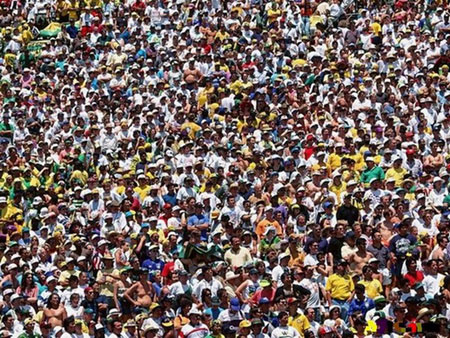WSJ Writer Says We Can Keep Growing and Growing
Published on May 16th, 2014
Matt Ridley is a member of the British House of Lords and author of a book entitled The Rational Optimist. He is so optimistic that he wrote a recent article in The Wall Street Journal claiming that “there are no limits [to growth].” Population can keep on growing, in his view, because “we can always invent new ways of doing more with less.” That may be optimistic, but it is hardly rational.
Like so many of the “endless growth” persuasion, Ridley observes that often predicted disasters didn’t happen because of man’s ingenuity. He notes that we’ve avoided food shortages by learning to farm land more efficiently. An example growth advocates commonly cite was the Green Revolution in agriculture which prevented famines predicted in the Sixties from coming to pass.
The problem with this thinking is that it assumes that the future will always repeat the past. That is not a reasonable assumption if many fundamental conditions are changing as the future unfolds. Since 1950, the most significant changing variable has been the skyrocketing growth of world population. At that time, within the memory of many people, world population was only 2.5 billion. Today it is 7.2 billion, and overall it is still surging, despite projections of “birth dearth” in some countries.
 Between now and 2050, scarcely more than 35 years, the current world population projection is a total of 9.6 billion, an increase of 2.4 billion. Thus, in that short span, the earth will add approximately the entire world population of 1950. And the projection from 2050 to 2100, is another 2.4 billion, making a total of 11 billion at the beginning of the next century.
Between now and 2050, scarcely more than 35 years, the current world population projection is a total of 9.6 billion, an increase of 2.4 billion. Thus, in that short span, the earth will add approximately the entire world population of 1950. And the projection from 2050 to 2100, is another 2.4 billion, making a total of 11 billion at the beginning of the next century.
Some questions arise. Will we have enough time to come up with another Green Revolution? And if we do, will we have the resources to implement it? More fertilizer for intensive farming, for example, will require petroleum, which may grow scarce and more expensive as a growing population makes multiple and increasing demands for it.
One variety of food production where we have become highly efficient is harvesting fish from the oceans. But in this instance, efficiency is becoming more of a problem than a solution. Today people consume four times as much seafood as they did in 1950. As a consequence, reports the BBC, “Global fish stocks are exploited or depleted to such an extent that without urgent measures we may be the last generation to catch food from the seas.” Fish farming can help meet future demand, but it causes a great deal of pollution, while also causing depletion of wild fish stocks needed to feed the farm fish.
 Will technology always save the day, as population surges ever upward? A better question might be, why take the risk? It’s not as if population projections are set in stone. We as human beings have the free will and the ability to change these outcomes, if we so choose. In this case, rational realism is a far better option than irrational optimism.
Will technology always save the day, as population surges ever upward? A better question might be, why take the risk? It’s not as if population projections are set in stone. We as human beings have the free will and the ability to change these outcomes, if we so choose. In this case, rational realism is a far better option than irrational optimism.
Something else to consider: For the sake of argument, let’s assume that technological advances can adequately sustain a population of 11 billion, or even 22 billion. Still, at some point, population growth will have to stop given the finite space on planet earth. But long before then we would have a world of gross overcrowding, as we already see in China, India, and elsewhere. And we would be living in a bland and sterile world, significantly bereft of wildlife and untamed nature.
The prospect of such a future is a rational projection of present trends. It leaves little room for rational optimism.




